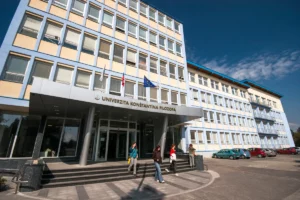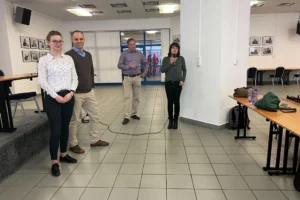The new year 2024 is upon us, but as far as the academic year is concerned, we are exactly halfway through it. I would, therefore, like to look back to the winter semester, when we managed to introduce the subject of Translation Project Management into the curriculum for the first time. Despite the not very high interest among students, as it was an elective subject, I am proud that we (ASAP-translation.com, s.r.o.), together with the Department of Translation Studies at the Constantine the Philosopher University in Nitra managed to fulfil our plans. Thanks especially to the head of the department doc Mgr. Emilia Perez, PhD. for her enthusiasm for the convergence of academic activities with practice. I would also like to thank the students for their truly active approach. They are proof that, despite the general trend of young people focusing on their comfort at an early age, there are those who try to take advantage of the opportunities offered by the school and want to prepare themselves for real life in the translation industry while they are still studying. I hope that I have managed to engage them in my classes and teach them the essential knowledge and processes of translation project management.
In today’s dynamic and interconnected world, the field of translation studies has seen a significant transformation. Translation projects have become more complex and demand a higher level of organization and coordination. To meet these evolving demands, it has become crucial for university departments of translation studies to incorporate Project Management as an integral component of their curriculum.
Project Management is the discipline of planning, organizing, and executing projects efficiently and effectively to achieve specific goals. In the context of translation studies, it involves managing translation projects from inception to completion. Here are some key reasons why teaching Translation Project Management (TPM) is necessary:
- Real-world relevance: In the professional world, translation projects are not just about linguistic skills; they involve time management, resource allocation, and communication with clients and team members. Graduates with TPM skills are better prepared to handle these real-world scenarios.
- Enhanced efficiency: TPM equips students with the tools and techniques to streamline translation processes. This includes the use of Translation Management Systems (TMS), which can automate tasks, manage terminology, and improve consistency in translations. We would like to thank CoScaleIT SPRL for providing the LSP.expert software free of charge to all students of the Translation Project Management course.
- Quality assurance: TPM emphasizes quality control and assurance throughout the translation process. By teaching students how to implement quality checks, revisions, and proofreading, universities ensure that graduates produce high-quality translations.
- Client satisfaction: TPM places a strong emphasis on client communication and understanding their needs. A Project Manager’s ability to liaise effectively with clients and provide them with regular updates is essential for building long-term client relationships.
- Market competitiveness: Graduates who are well-versed in TPM are more attractive to employers, as they can contribute to efficient project execution, leading to cost savings and better project outcomes.
- Adaptation to technology: TPM introduces students to various translation tools and technologies, making them proficient in using Translation Memory tools, CAT (Computer-Assisted Translation) tools, and other software commonly used in the industry.
By incorporating TPM into their curriculum, university departments of translation studies can ensure that their graduates are well-prepared to meet the demands of the translation industry. Moreover, it bridges the gap between academia and industry, producing professionals who can seamlessly integrate into the workforce.
In conclusion, as the translation industry evolves, it is imperative for translation studies programs to adapt and equip their students with the necessary skills, including Project Management. This not only benefits the students but also contributes to the overall growth and development of the translation field.


























